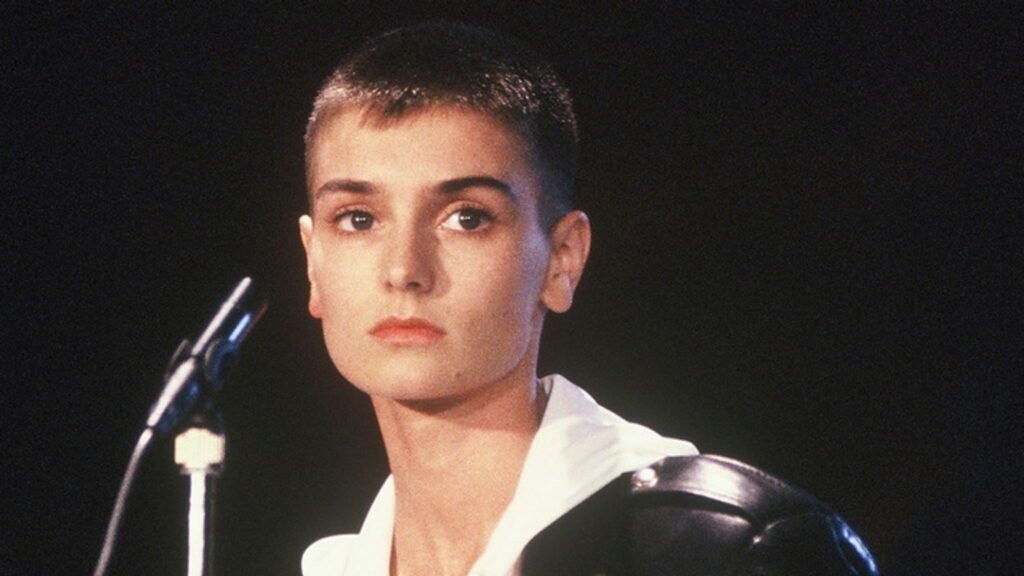Sinéad O’Connor’s voice has always been more than just a powerful instrument in the realm of music; it has been a beacon for truth, vulnerability, and the often uncomfortable realities of mental health struggles. Her willingness to share her personal battles with mental health has not only broken taboos but has also paved the way for a broader conversation about mental health awareness and stigma.
Sinéad O’Connor’s Career and Public Persona

Sinéad O’Connor’s rise to fame began in the late 1980s, marked by her distinctive voice and striking presence. Born in Dublin, Ireland, O’Connor’s early life was fraught with personal challenges, but she found solace and expression in music. Her debut album, “The Lion and the Cobra” (1987), immediately drew critical acclaim, showcasing her raw vocal power and emotional intensity. Tracks like “Mandinka” and “Troy” established her as a formidable new talent in the alternative music scene. O’Connor’s shaved head became her signature look, symbolizing both defiance and a rejection of conventional feminine norms, contributing to her unique and rebellious public image.
Breakthrough
O’Connor’s career reached its zenith with the release of her second album, “I Do Not Want What I Haven’t Got” (1990). The album’s lead single, “Nothing Compares 2 U,” written by Prince, became a global sensation. Its accompanying music video, featuring a close-up of O’Connor’s tear-streaked face, is iconic, capturing the profound emotional depth that resonated with millions of listeners worldwide. The song topped charts in numerous countries, solidifying her status as a major international star. The album itself was a critical and commercial triumph, earning her a Grammy Award and further cementing her place in the music industry.
Controversial Moments
Throughout her career, Sinéad O’Connor was never one to shy away from controversy. Her bold stances on various social and political issues often put her at odds with the mainstream media and public opinion. One of the most infamous moments came in 1992 when she tore up a photograph of Pope John Paul II on “Saturday Night Live,” protesting the Catholic Church’s handling of child abuse scandals. This act of defiance sparked outrage and led to a significant backlash, but it also highlighted her willingness to speak out against powerful institutions.
O’Connor’s outspoken nature extended to other areas as well. She frequently addressed issues such as women’s rights, LGBTQ+ rights, and the music industry’s exploitation of artists. Her refusal to conform to industry expectations and her candidness about her own struggles with mental health and personal trauma further shaped her public persona. These controversies, while often polarizing, underscored her commitment to authenticity and social justice, making her a figure of both admiration and debate.
Personal Struggles and Public Disclosure

Sinéad O’Connor’s life has been marked by significant mental health challenges, which she has openly discussed throughout her career. From a young age, O’Connor faced a tumultuous home environment, leading to early struggles with depression and anxiety. As she navigated the pressures of fame, these issues were compounded, resulting in a series of personal crises. O’Connor has spoken candidly about her battles with bipolar disorder, post-traumatic stress disorder (PTSD), and suicidal ideation, providing a raw and unfiltered look into her mental health journey.
Public Statements
O’Connor’s willingness to discuss her mental health struggles publicly has been both brave and groundbreaking. In a 2007 interview with Oprah Winfrey, she revealed her bipolar diagnosis and detailed her experiences with mood swings, despair, and suicidal thoughts. She explained how these issues had affected her career and personal life, aiming to shed light on the realities of living with a mental health disorder.
Her music also serves as a powerful medium for expressing her mental health struggles. Songs like “This Is to Mother You” and “The Healing Room” delve into themes of trauma, healing, and resilience. In 2015, O’Connor took to social media to share her struggles with depression and her experience in a psychiatric hospital, providing an unvarnished glimpse into her ongoing battle with mental health issues. These public disclosures, while often met with concern and sympathy, have also highlighted the persistent stigma surrounding mental health, especially in the public eye.
Impact on Fans
Sinéad O’Connor’s openness about her mental health has had a profound impact on her fans and the general public. By sharing her story, she has helped to destigmatize mental health issues and encouraged others to seek help and speak openly about their own struggles. Fans have often expressed gratitude for her honesty, noting how her transparency has provided comfort and a sense of solidarity for those facing similar challenges.
Her bravery in discussing such personal topics has also contributed to broader conversations about mental health in society. O’Connor’s disclosures have inspired many to advocate for better mental health care and to challenge the stigma associated with mental illness. Her influence extends beyond her music, making her a significant figure in the fight for mental health awareness and acceptance.
Breaking the Silence on Mental Health

During the peak of Sinéad O’Connor’s career in the late 1980s and early 1990s, mental health issues were heavily stigmatized. Discussions about mental health were often shrouded in shame and secrecy, with those suffering frequently marginalized and misunderstood. Public figures rarely disclosed their struggles, fearing backlash and damage to their careers. In this cultural climate, mental illness was often perceived as a sign of weakness or personal failure rather than a legitimate health condition. The media played a significant role in perpetuating these stigmas, typically focusing on sensational stories rather than empathetic understanding.
Pioneering Openness
In this context, Sinéad O’Connor’s honesty about her mental health struggles was nothing short of groundbreaking. By openly discussing her experiences with bipolar disorder, depression, and suicidal thoughts, O’Connor broke the silence that had long surrounded mental health issues in the public eye. Her candidness was a bold move that challenged the prevailing norms of her time. O’Connor’s willingness to speak about her mental health not only humanized her struggles but also highlighted the need for greater empathy and understanding.
O’Connor’s pioneering openness was reflected in her music, interviews, and social media presence. Songs like “No Man’s Woman” and “Hold Back the Night” explored themes of personal pain and resilience, offering listeners a glimpse into her inner world. Her 2007 interview with Oprah Winfrey, where she discussed her bipolar diagnosis, was a watershed moment that brought mental health conversations into mainstream media. By sharing her story, O’Connor paved the way for other artists and public figures to speak openly about their own mental health challenges, gradually shifting the cultural narrative.
Media Reaction
The media’s reaction to O’Connor’s disclosures was mixed, reflecting the broader societal attitudes toward mental health. On one hand, some outlets treated her revelations with sensitivity and respect, acknowledging the courage it took for her to speak out. These sympathetic responses helped to foster a more compassionate public discourse about mental health, highlighting the importance of addressing these issues openly.
However, much of the media coverage was less understanding. Sensational headlines and invasive scrutiny often overshadowed the nuanced reality of her struggles. O’Connor’s actions were frequently portrayed as erratic or attention-seeking, reinforcing negative stereotypes about mental illness. This sensationalism not only exacerbated the stigma but also underscored the challenges faced by those in the public eye who dared to speak about their mental health.
Despite these challenges, O’Connor’s impact on public discourse was significant. Her bravery in breaking the silence around mental health inspired countless individuals to share their own stories and seek help. Over time, this contributed to a gradual shift in how mental health issues were discussed and perceived, both in the media and society at large.
Influence on Mental Health Advocacy

Advocacy and Awareness
Sinéad O’Connor’s involvement in mental health advocacy has been a vital part of her legacy. Beyond her personal disclosures, she has actively participated in initiatives aimed at raising awareness and promoting better mental health care. O’Connor has used her platform to speak out on various occasions, advocating for those who struggle with mental health issues. She has participated in campaigns, given interviews, and written articles that address the need for systemic changes in how society treats mental health. Her advocacy efforts have underscored the importance of empathy, support, and access to mental health resources, making her a significant voice in the fight against mental health stigma.
Role Model
O’Connor’s bravery in sharing her own mental health struggles has positioned her as a role model for many. By confronting her challenges publicly, she has inspired countless others to do the same. Her candidness has encouraged fans and fellow artists alike to speak openly about their own experiences, creating a ripple effect that has helped to break down barriers and foster a more accepting and supportive environment for discussing mental health. O’Connor’s example has shown that it is possible to be both vulnerable and strong, and that sharing one’s struggles can be a powerful act of solidarity and healing.
Legacy
Sinéad O’Connor’s contributions have had a lasting impact on mental health conversations within the music industry and beyond. Her openness has paved the way for a new generation of artists who feel empowered to speak about their mental health without fear of stigma or retribution. Artists like Demi Lovato, Lady Gaga, and Logic have all spoken publicly about their mental health challenges, contributing to a growing movement of transparency and advocacy in the music world.
O’Connor’s influence extends beyond individual artists to the industry as a whole. There is now a greater emphasis on mental health awareness and support within the music community, with organizations like MusiCares and the Trevor Project offering resources and assistance to those in need. The conversation around mental health in the music industry has become more nuanced and supportive, reflecting the changes that O’Connor helped to initiate.
Remembering Sinéad O’Connor
As we remember Sinéad O’Connor, we honor a woman whose life and work have left an indelible mark on the world. Her voice, both in song and in advocacy, will continue to resonate, reminding us of the power of truth and the importance of compassion. Her courage in confronting her own demons and speaking out against injustice serves as a powerful reminder of what it means to live authentically and fearlessly.
Sinéad O’Connor’s legacy is one of profound impact and enduring influence. Her contributions to music and mental health advocacy have changed lives and will continue to inspire for generations to come. In celebrating her life, we commit to carrying forward the principles she championed—honesty, empathy, and courage—in our own lives. Rest in peace, Sinéad O’Connor. Your voice will forever echo in our hearts.
